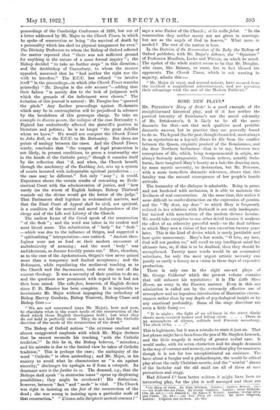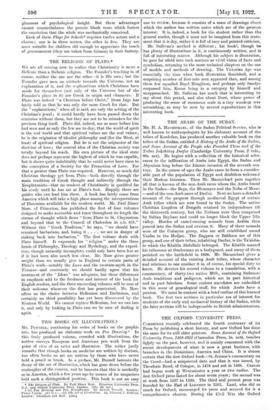SOME NEW PLATS.• Ma. PrrEasoN's Mary of Scots' is a
good example of the straightforward historical play, and if it has neither the poetical intensity of Swinburno's nor the moral solemnity of Mr. Drinkwater's, it is likely to be all the more dramatic for that—not that such qualities need prohibit dramatic success, but in practice they are generally found to do so. The legend (for the past, though chronicled, must always be as mysterious as a legend) draws its life from the conflict between the Queen, exquisite product of the Renaissance, and the dour Northern barbarians—that is to say, between two conceptions of life, which, being temperamental in origin, are always furiously antagonistic. Certain writers, notably Swin- burne, have imagined Mary's beauty as a bale-fire drawing men,
by some mystic necessity, to destruction, but Mr. Peterson, with a more immediate dramatic relevance, shows that this fatality was the natural consequence of her people's hostile
attitude.
The humanity of the dialogue is admirable. Being in prose,
and not burdened with archaisms, it is able to maintain the liveliness of real conversation. At the same time, this makes it more difficult to confer distinction on the expression of -passion, and the " My dear, my dear " to which Mary is frequently reduced in her relations with Bothwell is not only inadequate, but tainted with associations of the modem divorce heroine.
We would take exception to one other detail because it weakens the effect of an otherwise powerful work—to the final tableau in which Mary sees a vision of her own execution twenty years later. This is the kind of device which is rarely justifiable and
here quite unnecessary. Mary's last words, " 0 love, my love, God will not pardon us," will recall to any intelligent mind her ultimate fate, or, if this is to be doubted, then they should be
strengthened. Twenty more words would be an economical substitute, for only the most urgent artistic necessity can justify so costly a luxury as a vision in these days of expensive production.
There is only one in the eight one-act plays of Mr. George Calderon which the present volume contains that will enhance his reputation : it is The Little Stone House, an essay in the Russian manner. Even in this our admiration is called out by the extremely effective use of atmosphere and an ingenious introduction of illustrative circum- stances rather than by any depth of psychological insight or by
any emotional profundity. Some of the stage directions are even a little funny :- " It is night ; the light of an oil-lamp in the street dimly shoWs snow-covered houses and falling snow. . . . There is an atmosphere of silence, solitude and Russian monotony. The clock ticks. . . ."
This is legitimate, but it was a mistake to state it just so. That last phrase might have been from the pen of Mr. Stephen Leacock,
and the little tragedy is worthy of greater verbal care. It would make, with its seven characters and its simple demands in the way of costume and scenery, an excellent play for amateurs, though it is not for too unsophisticated an audience. The
farce about a burglar and a philanthropist, the would-be ethical play about the early Christian ascetic, and the " wistful " drama
of the bachelor and the old maid are all of them at once pretentious and stagy.
Had Edward /.3 been better written it might have been an interesting play, for the plot is well managed and there are • (1) Mary of Scots. By John Peterson. London : Andrew Melrose. les.] .—(2) Eight One-Act Plays. By George Calderon. London : Grant Richards. [10s. ed. net.]—(3) Edward I. By James F. Waight. London : George Allen and Unwin. [2s. ed.]—(4) Two Plays for Schools. By Ethel SIdgwlek. London &Iola and Jackson. [2s. ed.]
glimmers of psychological insight. But these advantages cannot counterbalance the prosaic blank verse which fosters the conviction that the whole was mechanically conceived.
Each of these Plays for Schools/ requires twelve actors and a chorus ; one is in three scenes, the other in five. They are most suitable for children old enough to appreciate the touch of gruesomeness (they are taken from Grimm) in their fantasy.



































 Previous page
Previous page